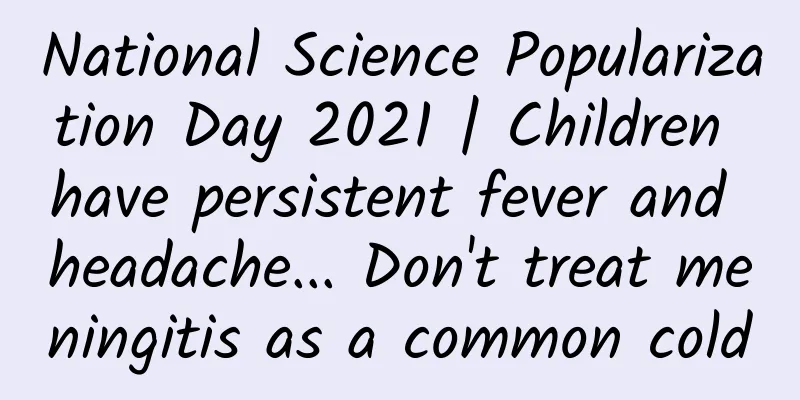National Science Popularization Day 2021 | Children have persistent fever and headache... Don't treat meningitis as a common cold

|
September 16 China Brain Health Day On September 8, the World Health Organization's Regional Office for Africa issued a statement in Kinshasa, the capital of the Democratic Republic of the Congo, announcing an outbreak of meningitis in Tchopo Province in northeastern Congo. As of September 7, the province had reported 129 deaths from meningitis and 261 suspected cases. On September 9, the Chinese Embassy in the Democratic Republic of the Congo also issued a reminder to prevent meningitis outbreaks. Meningitis is one of the major diseases that threaten life and health. In my country, the incidence of meningitis is highest in children under 5 years old, especially infants aged 6 months to 2 years old. What are the symptoms of meningitis and how can it be prevented? Meningitis is generally caused by infection with pathogenic microorganisms such as bacteria, viruses, tuberculosis, fungi and parasites. Among them, bacterial meningitis is the most serious. If not treated promptly, it may be life-threatening. People under 5 years old are at high risk The occurrence of bacterial meningitis is age-related and mostly occurs within 5 years of age, especially in infants and young children. It is a disease with a higher mortality rate among childhood infectious diseases, and nearly half of the survivors will have permanent neurological sequelae. Why are children more susceptible to bacterial meningitis? This is mainly because the baby's brain structure is not fully developed, the blood-brain barrier is not perfect, and the baby's own resistance is weak during this period. Some babies also have congenital anatomical defects (such as pilonidal sinus, cerebrospinal fluid otorrhea or nasal leakage, etc.), which makes it easy for bacteria to directly invade the brain through blood, ear or sinus infection and cause meningitis. Initial symptoms are atypical Meningitis has an acute onset, but the initial symptoms of infection lack specificity and are often manifested as upper respiratory tract infection symptoms, such as fever, headache, and muscle aches, which are often easily mistaken for common colds. Some babies will have some gastrointestinal reactions, such as vomiting and loss of appetite. Infants may show irritability, crying, and difficulty feeding. As the disease progresses, special manifestations of meningitis will further appear, such as: meningeal irritation signs and central nervous system symptoms, manifested as neck stiffness (such as stiff neck and inability to lower the head), increased intracranial pressure, severe headache, projectile vomiting, and even from initial fatigue, gradually develop to confusion or delirium, and finally coma. Clinical manifestations in infants and young children are nonspecific and may include hypothermia, convulsions, a full and tense anterior fontanelle, and altered consciousness. Timely treatment is key Bacterial meningitis requires emergency treatment. Any delay in diagnosis and treatment will cause permanent disability or even death. Early identification, timely and correct treatment, and long-term follow-up intervention after the disease are effective means to improve survival rate and reduce disability (mortality) rate. Therefore, if the child has a high fever that does not subside, parents should not hesitate to seek medical treatment in time. Treatment of meningitis includes both etiological treatment and symptomatic treatment. Cerebrospinal fluid examination (lumbar puncture) is the main basis for the diagnosis of bacterial meningitis. It can identify the pathogen as early as possible and give targeted anti-infection treatment. Antimicrobial drugs should be penicillins and third-generation cephalosporins that are easy to pass through the blood-brain barrier and safe for babies. While treating the cause, the baby's vital signs should be closely monitored, cerebral edema and intracranial hypertension should be reduced, and water and electrolyte balance should be maintained. 5 things you can do to prevent meningitis 1. Vaccinate your baby on time, such as Streptococcus pneumoniae, Haemophilus influenzae, Neisseria meningitidis, meningococcal meningitis vaccine and Japanese encephalitis vaccine, especially for babies with cerebrospinal fluid leakage, splenectomy, and hypogammaglobulinemia. 2. Do not feed your child food that you have chewed yourself, and do not feed your child mouth-to-mouth. 3. It is recommended to eat separately and use serving chopsticks. 4. Encourage your baby to wash his hands frequently and keep his hands clean. 5. Improve your baby's immunity by ensuring adequate sleep, balanced nutrition and proper exercise. Your baby’s “top priority” must not be taken lightly. If symptoms such as fever and headache occur, you should seek medical attention in time and actively cooperate with the doctor for treatment to avoid the occurrence of sequelae. Author: Zhang Wei, Chief Pharmacist of Shanxi Yangmei Group General Hospital Review expert: Ren Jianye, deputy director and pharmacist of Shanxi Yangmei Group General Hospital Wei Guoyi, Chief Pharmacist, Beijing Anzhen Hospital, Capital Medical University |
<<: When is the best time to eat duck blood vermicelli soup? How to make duck blood vermicelli soup
Recommend
Thoracic compression: Uncover the secret of your "compression"
Introduction: The thorax, the "breathing cas...
Is it okay to do manicure during breastfeeding?
Women love beauty at all times, no matter when th...
What medicine should I use for fishy leucorrhea
Leucorrhea is a normal discharge from the female ...
What should pregnant women do if they have milk spills?
After a woman becomes pregnant, there are many is...
Treatment of a large lump on the genitals
I believe everyone must know the importance of th...
Menstruation is coming soon. I feel dull pain in my lower abdomen.
In our lives, many women will have many physical ...
What are the precautions during menstruation?
There are many issues that women need to pay atte...
What is the reason for the sudden heavy menstrual flow during menopause?
When women reach menopause, they will experience ...
Diet for the first three days of normal delivery
The first three days after a woman gives birth ar...
What’s wrong with yellow leucorrhea if my period has not come?
Female friends are often troubled by problems suc...
Why is itchy on women's palms?
If your palms are always itchy, please do not tak...
What is the fastest way to lose weight after period?
Menstruation refers to the time when adult women ...
Pictures of vaginal candidiasis
Candidal vaginitis is a common gynecological dise...
Which department should I go to for genetic testing if I plan to have a second child?
The current opening of the second-child policy ha...
It hurts like a needle prick down there
The vagina is part of the female reproductive org...









